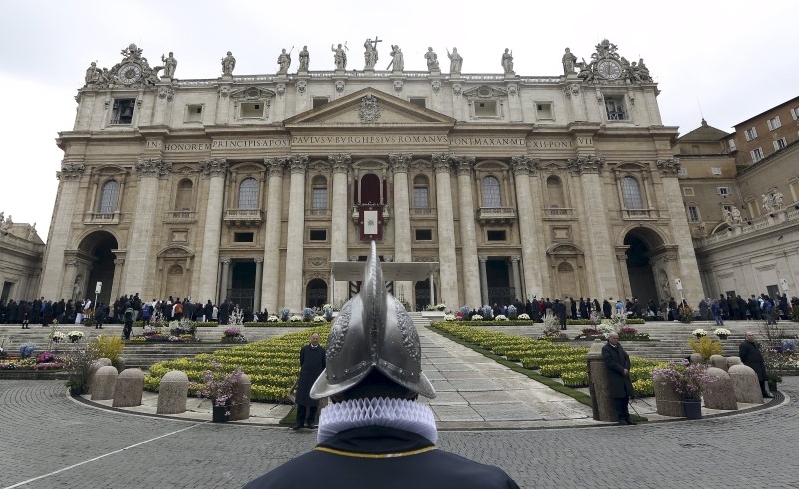
Vatican financial investigators suspect a department of the Holy See which oversees real estate and investments was used in the past for possible money laundering, insider trading and market manipulation, according to a report seen by Reuters.
The information in the confidential document, which covers the period from 2000 to 2011, has been passed on to Italian and Swiss investigators for their checks because some activity tied to the accounts allegedly took place in these countries, a senior Vatican source said.
While most of the media focus of the Vatican's murky finances has for decades centered on its official bank, the Institute for Works of Religion (IOR), a department called the Administration of the Patrimony of the Holy See (APSA), acted as its own financial powerhouse.
APSA, a sort of general accounting office, manages the Vatican's real estate holdings in Rome and elsewhere in Italy, pays salaries of Vatican employees, and acts as a purchasing office and human resources department.
One of its two divisions also manages the Vatican's financial and stock portfolio. The 33-page report suspects this division was used by an outsider for non-Vatican business, with possible complicity of APSA staff, in violation of its own regulations.
The internal investigation is part of a drive by Pope Francis to give Vatican financial authorities free rein to dig deep, over-ruling some cardinals who would prefer to forget the past now that the Vatican has enacted major reforms and instituted controls to thwart irregular practices.
Under Francis, the Vatican has overhauled its scandal-plagued bank, given more power to its Financial Intelligence Authority, appointed its first auditor-general and set up a new ministry to oversee economic activities of all departments, which previously ran their budgets with little or no control.
It is not clear whether this will be enough to bring full financial transparency to the traditionally secretive Vatican.
PAPAL USHER
The report by Vatican financial investigators zeroes in on the activity of Giampietro Nattino, chairman of Banca Finnat Euroamerica S.p.A, a family-run private Italian bank.
Vatican investigators suspect Nattino used the APSA accounts for personal trades on the Italian stock market, the report says, adding that the balance of more than 2 million euros was moved to Switzerland when the accounts were closed days before the Vatican introduced stricter new laws against money laundering that put money transfers under more scrutiny.
From May 22, 2000 to March 29, 2011 Nattino, who has served on the board of many Italian firms and volunteered as an usher in the papal palace, was the owner of APSA "Portfolio 339", which consisted of four separate accounts, the report says.
The report speaks of the "dubious origin and dubious final destination of the funds in the closing of portfolio 339" and asks why Nattino was allowed to have accounts at APSA in the first place in apparent violation of department regulations.
Those regulations, which are published on the Vatican's website and mentioned in the internal report, say the department can carry out financial transactions for third parties only on an "exceptional basis" and only with prior permission of the cardinal in charge.
Financial investigators gave their findings to the Vatican's Promoter of Justice, or chief prosecutor, Gian Piero Milano, a senior Vatican source said, adding that Milano had opened his own investigation.
The investigators asked the prosecutor to look into possible money laundering, insider trading and market manipulation related to Nattino's accounts at the conclusion of their report, which includes some 30 charts and graphs detailing stock holdings and transactions and bank transfers.
Vatican investigators suspect that on one occasion when his bank handled a stock placement, the APSA accounts were used to buy shares before they were allocated to other investors, according to the document.
The investigators also asked the prosecutor to look into "potential co-responsibility" by APSA staff in execution of the activity in the accounts and if the procedures followed "rules and internal practices" at the department.
Nattino's daughter Paola, who acts as company spokeswoman, declined to comment about Portfolio 339 and suspicions of irregularities connected to the accounts, saying in an email to Reuters that "it is our custom not to issue statements".
Milano's office did not return phone calls about the case. It has said in the past that it does not comment on investigations.
ANOMALY
The cardinal in charge of APSA from 2002 to 2011, eight of the 11 years covered by the investigation, was Italian Attilio Nicora, who is now retired.
The report does not specifically mention Nicora but cites the APSA regulation that only its head can exceptionally authorize financial operations for third parties.
In a letter to Reuters, Nicora said only that APSA was not a bank "because it does not lend money", but declined to comment on a list of questions sent by email via his secretary.
In one apparent anomaly, a 2012 evaluation of the Vatican by Moneyval, an arm of the Council of Europe that assesses compliance with international anti-money laundering standards, says APSA officials had told it that in 2001 the department decided to phase out individual account holders and that no new funds had been allowed to enter such accounts since then.
But the report on the internal investigation seen by Reuters says money was deposited into such APSA accounts from outside sources or moved between them in APSA as late as 2009.
APSA made headlines in June 2013 with the arrest of Monsignor Nunzio Scarano, who worked there for 22 years as a senior accountant. He is on trial in two cases. The first is on charges of conspiracy to smuggle 20 million euros in cash into Italy from Switzerland to help friends avoid taxes and the other is on charges he used the Vatican bank for money laundering. He denies all wrongdoing.






